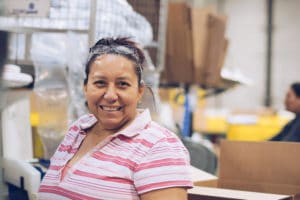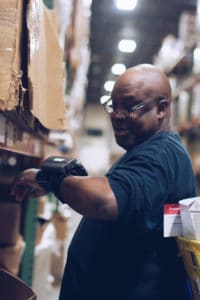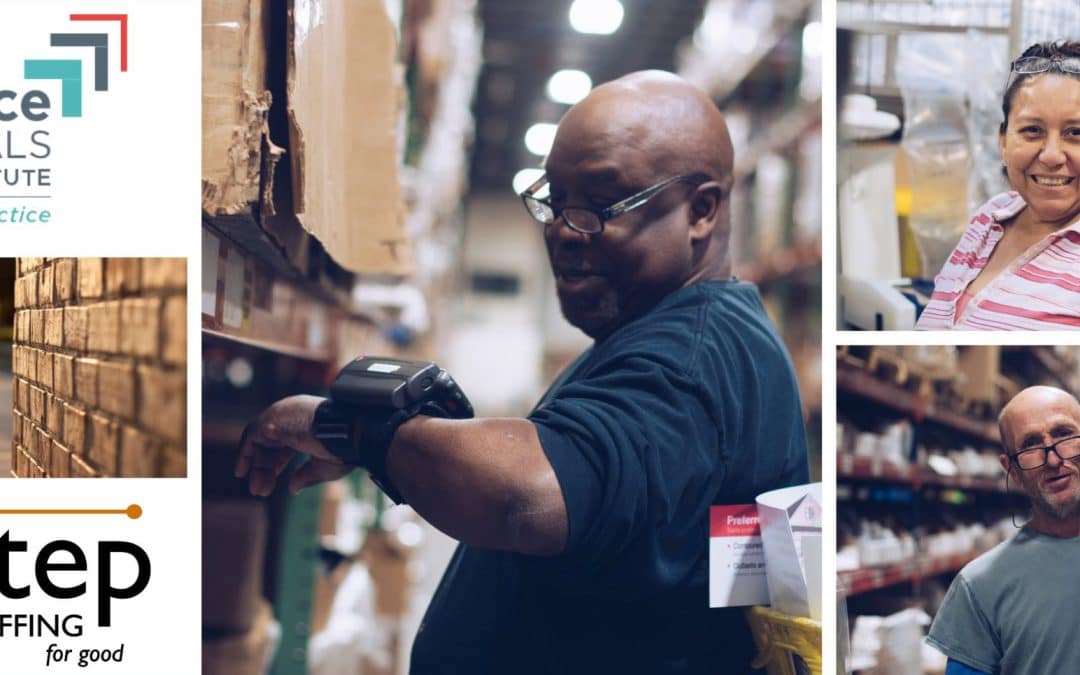Earlier this year, the Sorenson Impact Foundation announced the recipients of the 2020 Equitable & Resilient Recovery Grant program. In a time where access to employment and quality jobs is vital, we want to highlight the work of two of those grantees who are making strides in workforce development: First Step Staffing and Workforce Professionals Training Institute.

First Step Staffing has a vision to become the jobs solution for America’s homeless. CEO Amelia Nickerson described their work as “embracing the importance and dignity of work and believing that income is a critical component on the path out of poverty and homelessness.”
 “Prior to the COVID-19 pandemic, homelessness was already on the rise, and is now expected to grow more than 40% over the next three years as Americans face job loss, eviction and more,” commented Nickerson.
“Prior to the COVID-19 pandemic, homelessness was already on the rise, and is now expected to grow more than 40% over the next three years as Americans face job loss, eviction and more,” commented Nickerson.
The research is clear – men and women of color and those living in poverty have been disproportionately affected by the current health and economic crisis. Jobs will be an essential piece of our nation’s recovery.
As the largest alternative staffing agency in the country, First Step is prioritizing job placement and training for those that have been most disenfranchised from the workforce. Support from the Sorenson Impact Foundation this year helped First Step to launch a five-year effort to expand its mission into new markets while also increasing the supportive services offered to its clients. Over the next five years, First Step will reconnect thousands of men and women to the workforce, pay millions in earned wages, and empower individuals to become active members in their communities.
FIRST STEP’S WORK IN ACTION
After serving 24 consecutive years in prison, Mr. Hightower was released with a bus ticket to his last known address. In 24 years a lot had changed. The entire outside world was different from when Mr. Hightower remembered in 1996.
 Not only did he not have a phone to call someone for help, he had no one to call. He roamed the streets for seven days searching for a place to rest his head at night. Someone he met along the way recommended he come to First Step. When staff arrived that morning, Mr. Hightower was waiting outside of our doors, soaking wet; he had walked six miles in the rain to get to First Step Offices “first thing in the morning.”
Not only did he not have a phone to call someone for help, he had no one to call. He roamed the streets for seven days searching for a place to rest his head at night. Someone he met along the way recommended he come to First Step. When staff arrived that morning, Mr. Hightower was waiting outside of our doors, soaking wet; he had walked six miles in the rain to get to First Step Offices “first thing in the morning.”
Both First Step’s job coaches and support services specialists met with Mr. Hightower, and they determined that he was not yet ready to work. He did not have an up- to-date state issued ID, he had some medical issues arise while incarcerated that needed to be further addressed, and he was still mentally reeling from the shock of the world around him being so different than what he remembered and knew.
Immediately, First Step’s Support Services team secured temporary shelter for Mr. Hightower. Next, they connected him with the First Step Disabilities Services team who helped him secure SSI benefits so he could support himself while getting back on his feet. First Step then gave him food and provided transportation to his temporary housing.
Over the next week, the First Step team worked with Mr. Hightower daily to assist him with getting a new ID, making medical appointments, helping him navigate public transportation and learning more about what he wanted to do once everything was sorted out. He said he wanted to work.
Four months later, Mr. Hightower came back to First Step, on his own, via public transportation. He had been moved to transitional housing and had spent most of his time getting healthy so he could get to work. He is coordinating with First Step’s job coaches on part-time employment and he is already talking about moving up into full time.
Workforce Professionals Training Institute (WPTI), a workforce development organization in New York City, has teamed up with Salesforce.com and Arkus Inc. to bring digital transformation to the workforce development sector first in New York City, and eventually across the country.
(WPTI), a workforce development organization in New York City, has teamed up with Salesforce.com and Arkus Inc. to bring digital transformation to the workforce development sector first in New York City, and eventually across the country.
“While online-training has long been the norm in many industries and for many job-seekers and employees, there have been tremendous lags in bringing these capabilities to lower income people often living in resource-deprived neighborhoods,” says Sharon Sewell-Fairman, CEO of WPTI.
During the pandemic, WPTI pivoted to remote operations and quickly adapted its face-to-face, experiential style for its training, consulting and systems building programs to a virtual format. As a result, they were able to respond to the immediate and changing needs of community-based workforce organizations in the short term. Now, Sewell-Fairman says that “[they] are providing training and capacity building to help other community-based workforce organizations adapt their job training and education programs and infrastructure to better serve low-income jobseekers in this new environment.”
Sewell-Fairman explained that the COVID-19 pandemic hit New York very hard with resulting unemployment rates nearly twice the national average. Several core workforce sectors, including hospitality, food service, transportation, and retail, were decimated. And approximately 69% of layoffs hit workers of color, who were already disproportionately clustered in lower-income jobs.
 WPTI’s Digital Transformation Initiative will provide capacity building and training to community-based workforce organizations so they can assist unemployed New Yorkers by digitizing and delivering online training to build the skills and capabilities needed by displaced workers as they struggle to find their way back into labor markets.
WPTI’s Digital Transformation Initiative will provide capacity building and training to community-based workforce organizations so they can assist unemployed New Yorkers by digitizing and delivering online training to build the skills and capabilities needed by displaced workers as they struggle to find their way back into labor markets.
“Our approach focuses on bringing digital training capacity – both training content and training delivery systems – to job seekers by leveraging our network of over 600 organizations in NYC spread across all five NYC boroughs and with deep community commitments to economic equity,” shared Sewell-Fairman.
The partnership and support from the Sorenson Impact Foundation is aimed at helping workforce organizations and their staff to adapt practices to meet the changing needs of jobseekers and employers in this new age and a digital economy. This grant not only contributes to the development of WPTI’s own digital infrastructure, but the digital infrastructure, digital fluency, and virtual service delivery model of New York City’s workforce development providers, as they work to better prepare and connect an increased number of low income individuals to quality jobs and careers that pay family supporting wages post COVID-19.
